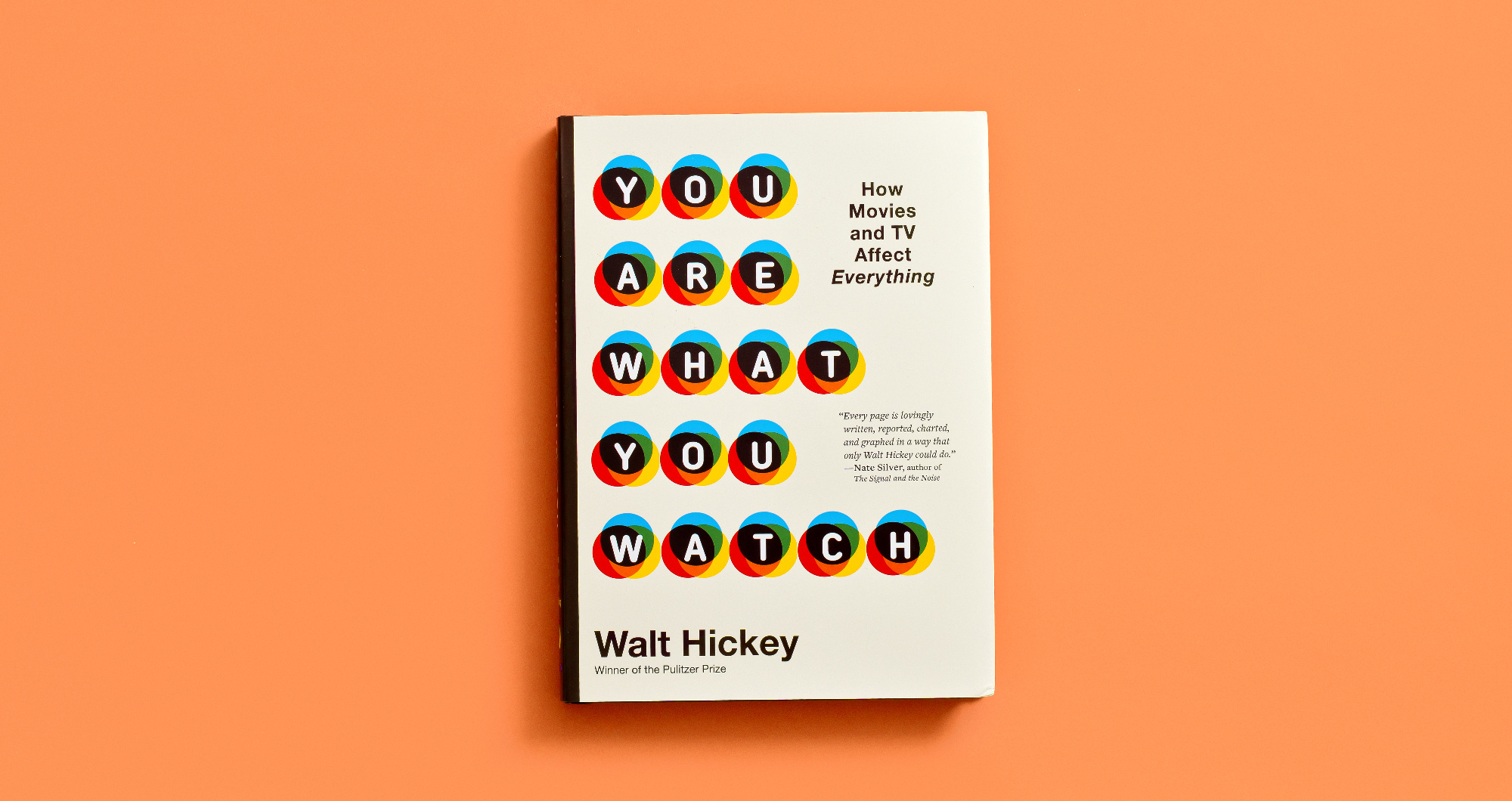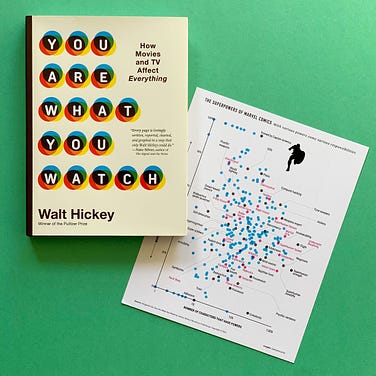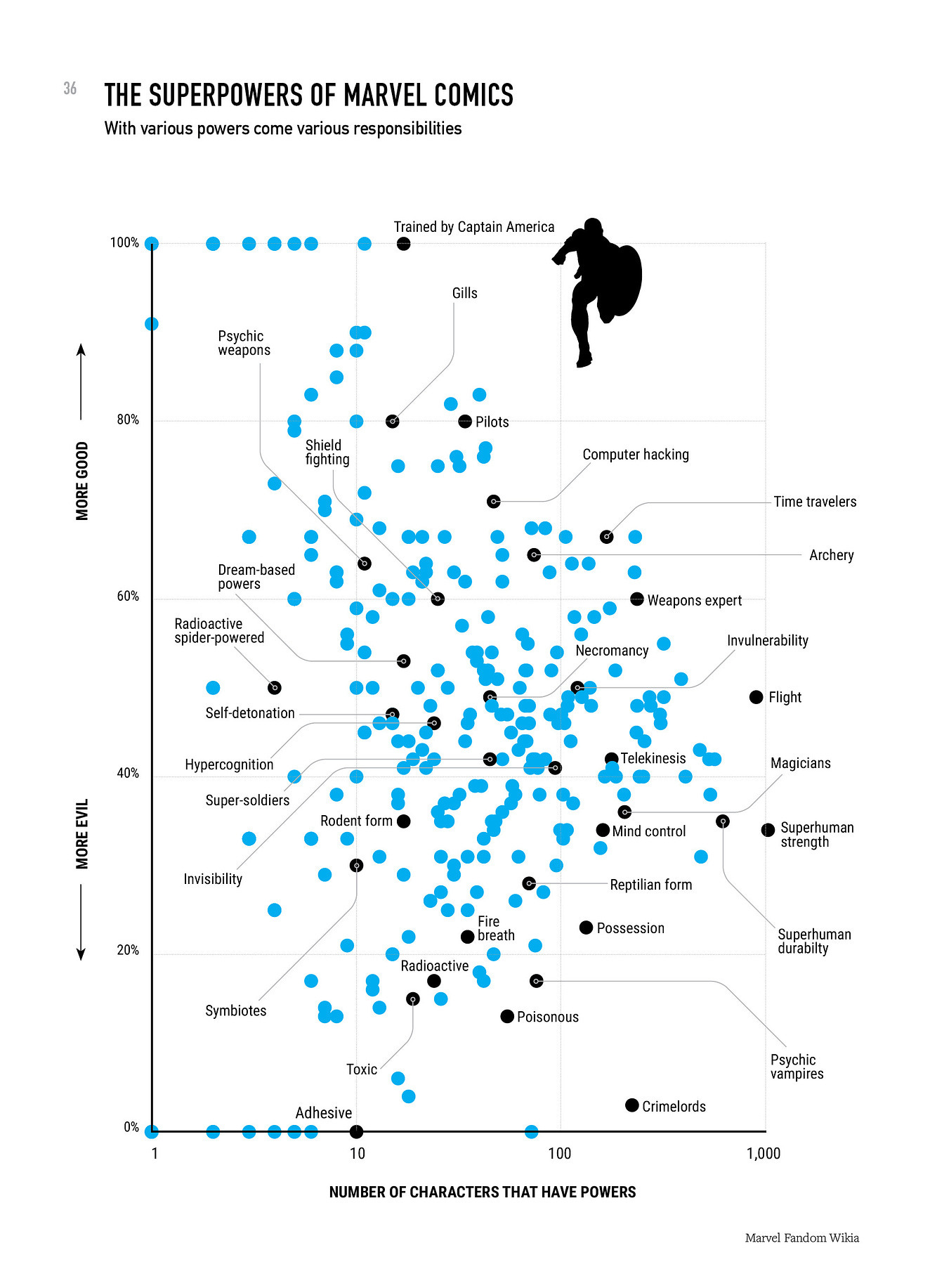Numlock Sunday: Exclusive excerpt from You Are What You Watch
By Walt HickeyHello and welcome to a very special book excerpt in the Numlock Sunday edition. All you folks have been so supportive of You Are What You Watch, my first-ever book, which is out this Tuesday! It’s the result of several years of reporting and writing, and I couldn’t be prouder of it. If you like the newsletter, you’re really going to like the book. It’s about all the cool ways that movies and pop culture impact your body, brain, kids, identity, travel, sports, crime, spies, science, war, stores, money, names, dogs, taxes, countries, friends, enemies, and the people who make them. As part of the preorder campaign, anyone who orders it early can fill out this form to get a cool print of one of my favorite charts from the book. When considering which excerpt I was going to get for the Numlock readers exclusively, I felt like the part around that chart would be especially exciting. This is from chapter three, which goes into how stories change the way people see themselves and their own identities. If you have not yet ordered the book, it would mean the world to me if you did, from your local bookstore, from Barnes & Noble, from Amazon, wherever. Preorders are the most important thing for a book’s success, so getting in an early order is huge. If you do, make sure to fill out the form and claim your print, too! How to Build a SuperheroSuperhero characters, at their core, are aspirational ideals. So, where’d they come from? Tom Brevoort started reading comics when he was six, when his dad would pick up cartons of cigarettes and Tom would get entranced by the spinner rack near the checkout. He went to the University of Delaware to study illustration and eventually landed a gig at Marvel Comics in the summer of 1989, right as comics were getting red-hot. The market would implode shortly afterward, but Brevoort stuck around and climbed to the position of executive editor of Marvel Comics. During that time, he would bear witness to the creation of all sorts of heroes. “The Marvel Universe is the world outside your window,” claimed Brevoort. “In effect, the audience and the characters inhabit a world that is the same, and so the problems that they have to deal with are problems that are similar to the problems and the issues and the concerns that the audience may be dealing with.” It’s rare that Marvel just creates a character out of thin air and launches a book about them. Even in the old days, that was rare: There’s a reason why lots of the huge characters of today got their start in anthology series like Tales to Astonish or Amazing Fantasy. Even in the heady creative days of the early 1960s it was a lot to ask of an audience to spend their hard-earned paper route money on a new book sight unseen. Introducing a new hero in the Marvel world is more complicated than you might imagine. Heroes need to be empathetic, but also empathetic in new and interesting ways. They are meant to represent an aspirational part of ourselves, the operative word being part. They succeed when they exemplify a virtue or a point in life, and when, even if you can’t empathize with their totality, you can be drawn in by something that makes them compelling. Perhaps you empathize with Daredevil because he’s Catholic, or blind, or a martial artist, or lives in Hell’s Kitchen. Or because he’s an attorney, or he came from a single-parent home, or he dislikes corruption, or any number of those things — but you don’t need to be a blind Catholic martial artist from a single-parent home in Hell’s Kitchen who practices law and despises corruption. Because of all that, he’s able to tell stories that other characters — for example, ahem, Episcopalian technologists from Forest Hills — can’t. Good vs. Evil Where a superhero gets their powers can have a strong bearing on what kind of hero they are. Plenty of powers are just in the middle, without skewing one way or another. The power of flight, skill in martial arts, fencing, superhuman reflexes or agility, telekinesis, force field, and invulnerability — those powers are often just elements of the basic kit of anyone able to hang tough in the rough-and-tumble Marvel Universe, regardless of which team they’re on. Some powers seem to be possessed only by the good at heart. People with superhuman senses such as precognition (especially heightened awareness and night vision), empaths, multilinguists, time travelers, athletes, healers, archers, equestrians, and gymnasts all tend toward heroism rather than villainy. Hackers, clairvoyants, and pilots are also particularly inclined toward goodness. Interestingly, most of those powers tend to be very team-based or support types — the healing and the senses and the fast travel — or tend to be self-taught or involve discipline, such as the archers, horse riders, and gymnasts. Put together, the powers that break most heroic are the ones that are innately helpful to others or took a great deal of work to attain. It’s odd to see hackers as good just as often as healers, but those are both roles that are most effective when they’re part of a team. What this means is that the powers that contribute to the success of others — that is, people who help not only people in need but the super-people who help people in need — tend to be a special class of good. The powers that are more neutral and merely escalate one’s own potential are a bit more of a dice roll. Other powers are reliably linked with evil characters. Superhuman strength, durability, shape-shifting, armored suits, teleportation, pyrokinesis, using magic — all of those are popular powers that on balance tend to break bad. Immortals are bad about two-thirds of the time, and the ability to psychically possess other people tends to lead one down a dark path fairly often, as do claws, hypnosis, biological manipulation, and a reptilian form. Being poisonous or toxic is a reliable indication that someone’s not on the side of truth, justice, and the American way, nor is being sticky, or a demon, or radioactive, or a psychic vampire. The more villainous power sets are interesting because they tend to involve either someone getting superior power from gifts rather than labor, or very offensive-oriented attacks like fire and claws, or deriving that strength and power from an external source like a power suit or magic. Also, several powers — hypnosis, possession — are inextricably linked to coercing people to do things they don’t want to do. So, if the powers that skew toward team-based collaboration are the ones that most often skew positive, it’s the antisocial powers — the ones based on intimidation or compulsion — that more often break bad. In Marvel’s world, your ability isn’t your destiny — there aren’t too many powers that are exclusively good or exclusively bad — but when you get a gift you can’t share, you’re liable to succumb to the corruption that comes with power. Heroism isn’t only about where you got your powers, it’s also about how you got them. At Marvel, the origins of heroes were very much of the eras when those heroes were created. Jack Kirby, who was instrumental in developing early Marvel characters, was plugged into the science scene of the times. That’s one reason so many of the heroes of that age got their which was pushing the United States to the forefront of global geopolitics. During the creative renaissance at Marvel through the 1960s, heroes came from space exploration (The Fantastic Four), from military nuclear weapons testing (The Hulk), and from the bleeding edge of the civilian science of radiation (Spider-Man and Daredevil). The same radioactivity that in Japan created Godzilla created super-men in the United States. The early 1960s involved lots of spaceflight tests. The H-bomb testing at Bikini Atoll brought verisimilitude to Bruce Banner’s job. Iron Man’s wealth and armor originally came from the Vietnam War. The X-Men, with their mutant powers, emerged just ten years after the discovery of DNA’s double helix structure by Watson, Franklin, Crick, and Wilkins and during a wildly productive time for genetic research. But heroes aren’t made in a lab. It’s not a coincidence that very often the same thing that grants a hero their powers also empowers their enemies, be it mutation or scientific mishaps or radiation. It’s from this point that we begin to understand one of the other most important things about developing a hero: the villains who oppose them. Excerpted from “You Are What You Watch” (Workman) by Walt Hickey. Copyright © 2023. Data visuals copyright © by Heather Jones (art) and Walt Hickey (data). Invite your friends and earn rewardsIf you enjoy Numlock News, share it with your friends and earn rewards when they subscribe. |
Older messages
Numlock News: October 20, 2023 • Sprite, Paint, Butts
Friday, October 20, 2023
By Walt Hickey Have a great weekend! Everyone gets the Sunday edition this week. Those You Are What You Watch preorders are coming soon, order yours today to make sure you get it on launch day:
Numlock News: October 19, 2023 • Wilma, Sawfish, Thames
Thursday, October 19, 2023
By Walt Hickey We're now just one week away from my book release! The final stretch! Next week is going to be a lot of fun. Soon my daily asks to order the book will end, but for now, get a
Numlock News: October 16, 2023 • Toys, Jets, Eras
Thursday, October 19, 2023
By Walt Hickey Welcome back! We're now just one week away from my book release. If you like this newsletter, you will love this book. Also, while a whole lot of you have preordered it, not everyone
Numlock News: October 17, 2023 • Oranges, Romance Novels, 12-Foot Home Depot Giant-Sized Skeleton
Thursday, October 19, 2023
By Walt Hickey We're now just one week away from my book release. I'm so grateful for everyone who has preordered, it really means the world to me. If you haven't preordered yet, if you
Numlock News: October 18, 2023 • Lunchables, Pepper X, Killers of the Flower Moon
Thursday, October 19, 2023
By Walt Hickey Thanks to everyone who came out last night in San Francisco! One week away from my book release, so every preorder counts. If you want to hear some more about the book, I was so thrilled
You Might Also Like
Flywheel Conference: Meet us in Wenatchee, May 21-23!
Wednesday, March 19, 2025
Discover Washington State's premier event for entrepreneurs and investors to connect GeekWire is pleased to present this special sponsored message to our Pacific NW readers. Watch startups compete
🔐 Secure Your Internet Connection
Wednesday, March 19, 2025
You deserve a digital shield for your online life In a world where headlines scream about abuses of power, your right to privacy has never been more critical. As a conscientious citizen who wants to
Rock the Vote
Wednesday, March 19, 2025
Contrary to popular opinion... ͏ ͏ ͏ ͏ ͏ ͏ ͏ ͏ ͏ ͏ ͏ ͏ ͏ ͏ ͏ ͏ ͏ ͏ ͏ ͏ ͏ ͏ ͏ ͏ ͏ ͏ ͏ ͏ ͏ ͏ ͏ ͏ ͏ ͏ ͏ ͏ ͏ ͏ ͏ ͏ ͏ ͏ ͏ ͏ ͏ ͏ ͏ ͏ ͏ ͏ ͏ ͏ ͏ ͏ ͏ ͏ ͏ ͏ ͏ ͏ ͏ ͏ ͏ ͏ ͏ ͏ ͏ ͏ ͏ ͏ ͏ ͏ ͏ ͏ ͏ ͏ ͏ ͏ ͏ ͏ ͏ ͏ ͏ ͏ ͏
Madrona turns 30 | Microsoft HR chief shifts role | Icertis lands $50M
Wednesday, March 19, 2025
Google's $32B acquisition of Wiz will shake up cloud security ADVERTISEMENT GeekWire SPONSOR MESSAGE: Revisit defining moments, explore new challenges, and get a glimpse into what lies ahead for
Last call to grab tickets for GeekWire's Microsoft@50, featuring Ballmer, Smith and Myhrvold
Wednesday, March 19, 2025
Last call to grab tickets for GeekWire's Microsoft@50, featuring Ballmer, Smith and Myhrvold View this email in your browser GeekWire's Microsoft@50 event, marking the tech giant's
🔪 Trump’s Tuesday Night Massacre
Wednesday, March 19, 2025
The billionaire's rage-tweets made your medicine more expensive while killing your town's small businesses. Forward this email to others so they can sign up 🎧 Lever Time Premium EXCLUSIVE:
It’s even worse than we thought
Wednesday, March 19, 2025
What we're seeing right now from Donald Trump is a full-on authoritarian takeover of the US government. What we're seeing right now from Donald Trump is a full-on authoritarian takeover of the
☕ Say cheese
Wednesday, March 19, 2025
Why Cheez-It's parent company is embracing basketball. March 19, 2025 View Online | Sign Up Marketing Brew Presented By Tubi Welcome to Wednesday. Madison Avenue is one step closer to getting
☕ Manual transmission
Wednesday, March 19, 2025
Razor's kid-friendly assembly instructions. March 19, 2025 View Online | Sign Up Retail Brew Presented By IM Digital It's Wednesday. Don't miss out—join us tomorrow for a virtual event that
Trump, El Salvador, and the Alien Enemies Act.
Wednesday, March 19, 2025
Who got deported, where did they go, and why? Trump, El Salvador, and the Alien Enemies Act. Who got deported, where did they go, and why? By Isaac Saul • 19 Mar 2025 View in browser View in browser El



